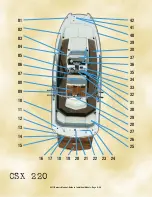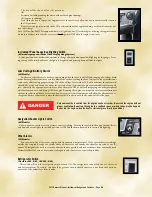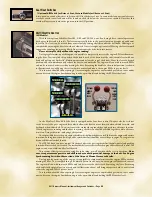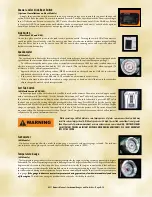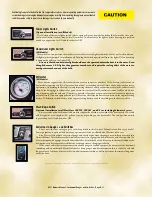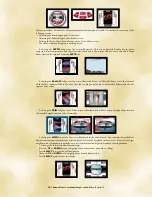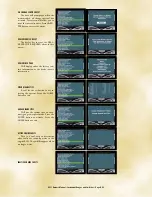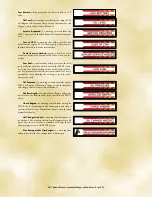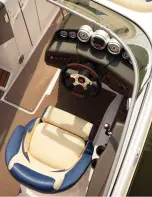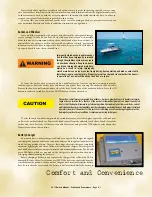
2011 Owners Manual...Instrument Gauges and Switches...Page 5-9
Seat Heat Switches
(Optional All Models for Driver’s Seat; Certain Models for Observer’s Seat)
A two-position switch allows heat to be turned ON for the driver’s seat. In some models, an optional observer
seat heat switch is available and will be found on the deck below the observer seat cushion. Note that this
switch will operate only when the ignition is in the ON position.
Shift/Throttle Control
(All Models)
With the exception of the MariStar 280, X-80 and CSX-265, a one-hand, single-lever control operates as
both a gear shifter and a throttle. The lever automatically locks in the neutral position (straight up and down)
for safety. The lever can be moved from neutral only by raising the lifter under the ball knob. Shifting is ac-
complished by moving the lever forward or backward. Center (straight up) is neutral. Moving the lever forward
engages the running gear; moving it back from center puts the drive train into reverse.
Never attempt to shift without the engine running!
During regular warm-up of the engine, it is possible to temporarily increase the engine RPMs without mov-
ing the boat. To accomplish this, push in the button located at the bottom of the shift/throttle lever with one
hand and pull up the “umbrella” (aluminum surround below the top of the knob). Move the lever to desired
position and then simultaneously release the button and umbrella. The engine will run with increased RPMs
and can be increased or decreased by moving the lever. Returning the handle to the neutral position (as shown
in illustration above) will bring the system back to neutral and reduce the engine RPMs to pre-set levels.
This function should be done sparingly. Over-revving the engine for any extended period can cause undue
wear and tear on the engine. Avoid advancing to wide-open-throttle and holding the RPMs at that level.
In the MariStar 280 and X-80 the boat is equipped with a four-lever control. The port side lever closest
to the driver is the port engine shifter, which allows the boat to move forward when shifted forward, and
backward when shifted aft. The next lever is the starboard engine shifter and performs the same function.
If both engines are running and the boat is moving, the shifters should be shifted together and in the same
direction. Doing otherwise can damage the system.
The next middle lever is the port engine throttle, which allows the boat to feed fuel into the engine and operate
in motion. Pushing forward on it will signal the system that fuel should be sent to the port engine. The engines can
be run at different levels of throttle.
The CSX 265 has a two-lever control. On the port side is the port engine shifter/throttle control, and pushing
forward will move the boat forward. The starboard side lever is the starboard engine shifter/throttle control. The
engines can be run at different levels of throttle.
This system allows greater maneuverability in docking, as well as when the boat is in operation.
How-
ever, it requires more practice and skill in order to avoid potential damage to the boat. See Engine
Synchronizing Switch in this section of the Owner’s Manual for more details.
During regular warm-up of the engine, it is possible to temporarily increase the engine RPMs without
moving the boat. To accomplish this, pull outward (lateral to the unit) on the engine shift/throttle control.
The engine will run with increased RPMs and can be increased or decreased by moving the lever. Returning
the handle to the neutral position (as shown in illustration above) will bring the system back to neutral and
reduce the engine RPMs to pre-set levels.
This function should be done sparingly. Over-revving the engine for any extended period can cause undue
wear and tear on the engine. Avoid advancing to wide-open-throttle and holding the RPMs at that level.
Port engine shifter
Port engine throttle
Starboard engine throttle
Starboard engine shifter
MariStar 280, X-80
Port engine
combined
shifter/
throttle
Starboard
engine
combined
shifter/
throttle
CSX 265
Summary of Contents for prostar 190 2011
Page 26: ...Guide to Individual Models 2011 Owners Manual Guide to Individual Models Page 4 1...
Page 81: ......
Page 93: ......
Page 105: ......

